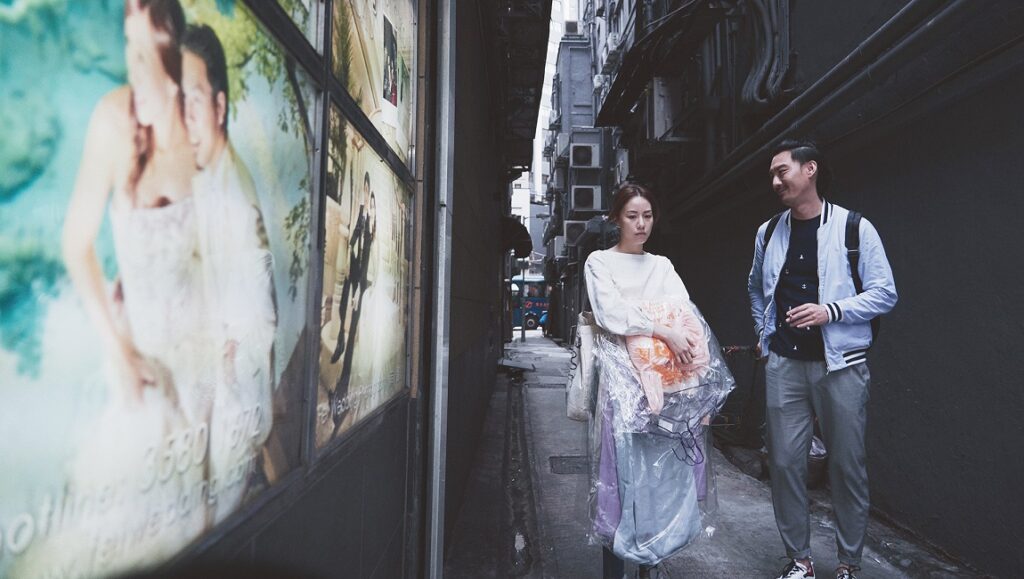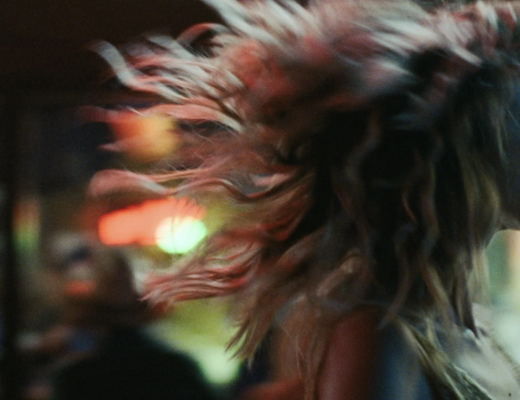Beasts Clawing at Straws
The new Korean crime thriller Beasts Clawing at Straws is a derivative, charmless bit of Tarantino-aping nonsense, a convoluted mess so in love with its own serpentine narrative machinations that it forgets to create actual characters or do anything interesting with them. First time director Kim Yong-hoon clearly likes the Coen brothers as well, as he aims for a similar kind of pitch-black gallows humor, but he just doesn’t have the chops to pull it off. The structuring device here is a bag full of cash, first stumbled upon by Joong-man (Bae Seong-woo), a janitor at an upscale men’s spa. He’s not entirely sure what to do with it, so he stashes it in the lost and found. We are then quickly introduced to Tae-young (Jung Woo-sung), a corrupt customs agent who’s in debt to a violent loan shark; Mi-ran (Shin Hyun-bin), a young woman stuck in an abusive marriage and forced to prostitute herself due to crippling debt; Jin-tae (Jung Ga-ram), a mysterious young man who becomes Mi-ran’s lover and offers to kill her husband for her; and finally Yeon-hee (Jeon Do-yeon), who works as Mi-ran’s madame and is also responsible for getting Tae-young into trouble with the aforementioned loan shark. Each has their own reasons for needing the money; the film’s central mystery revolves around where it came from in the first place, who’s going to get it, and when.
The actors here are almost uniformly good, each one doing what they can with roles that are either over- or under-written, but director Kim seems never to have come across a single noir cliché he doesn’t like. He doesn’t seem particularly interested in these people as characters outside of plugging them into various scenarios, each one cribbed from countless other movies and novels (that these hapless pawns are referred to as ‘beasts’ in the film’s title is certainly revealing). As we go through the motions of best laid plans gone awry, each narrative strand is mostly separate from the other, until eventually Kim threads them together and reveals that these narratives aren’t necessarily happening concurrently. Once he replays the film’s opening shot a second time at around the halfway point, it should be an ‘aha!’ moment, the kind of thing where all the pieces snap into place and the narrative crystallizes. Instead, the whole endeavor is lethargic, lacking any kind of spark or energy that might elevate this to more than just the sum of its narrative gamesmanship. The murder and double-crosses feel perfunctory, like marking off boxes on a checklist. It’s a dour, humorless affair, which ends on a bit of faux-ironic nihilism that sticks in the craw. You’re better off with a genuine provocateur like Jim Thompson or the real-deal cynicism of Blood Simple. Daniel Gorman
They Say Nothing Stays the Same
Ten years after his debut feature, Looking for Cherry Blossoms (2009), actor-turned-director Joe Odagiri‘s belated follow-up, They Say Nothing Stays the Same, was selected in a sidebar of last year’s Venice Film Festival. A meditative lamentation for a defunct way of life, the film is centered around lowly ferryman Toichi (Akira Emoto), whose livelihood is threatened by the construction of a new bridge on his stretch of a Japanese river. When he encounters a young girl drifting aimlessly through the water, he feels bound to take her in, which leads him to confront the harsh realities of his own future. The characters Toichi ferries across the river provide their own catalysts for catharsis, ranging from a forgetful doctor eager to embrace change, to a nostalgic old woman (enlivened in lovely fashion by Mitsukô Kusabue) returning to her birthplace only to realize that the now-desolate village she once called home no longer means anything to her. Odagiri’s somber observations about transitional issues within traditionalist communities make this slow disquisition of a dying occupation a rewarding experience. While Toichi may be contemplating his impending redundancy, he does not outwardly betray his emotions until the dawn of industrialization is forced upon him. “When something new comes along, the old things go. That’s how it is,” he explains to his mysterious rescuee, as Emoto movingly, soulfully embodies this weathered veteran. Given the expertise of the assembled crew, the film unsurprisingly looks gorgeous: with his customary flair, cinematographer Christopher Doyle capitalizes on the picturesque potential of Japan’s stunning river bends, while Academy Award-winning costume designer Emi Wada authentically captures the quaintness of rural living. While They Say Nothing Stays the Same is largely a patient and understated drama, its epilogue of sorts, in which the introduction of an extremely violent plot device forces the characters’ hands, feels rather drastic. This abrupt tonal shift is strange, but not entirely without power, its bleakness reinforcing many of Odagiri’s recurring themes: the demands of economic efficiency and the thankless nature of a life lived in humble servitude. Calum Reed
Victim(s)
Victim(s), the debut feature from Layla Zhuqing Ji, is the latest in a long line of cautionary tales in which it is made abundantly clear from frame one that the kids today are not all right. The medium of film has certainly never shied away from the subject, with 1936’s Reefer Madness being one of the first and most recognizable examples of the fear-mongering most filmmakers apply to the cinema territory of youths gone wild. Victim(s) doesn’t quite reach the dizzying heights of propaganda as that infamous relic, but Ji still operates with a heavy hand: her film portrays a Malaysian high school plagued by bullying, with these transgressions magnified by the omnipresent technology in the hands of both perpetrators and victims. A teenager’s emotional life is nothing if not heightened, and an argument could be made that Ji is simply embracing those melodramatic instincts in presenting her story of troubled teens. Unfortunately, it does a disservice to the very real problems at the heart of her story, and before long, subtlety curdles into hysteria as acts of violence, humiliation, and degradation begin to pile on top of one another, leaving the viewer in a state of numbness. There is a fairly interesting story buried within all of the shock value, that of parents being confronted with hard truths about the children they only thought they knew. Hints of We Need to Talk About Kevin simmer beneath the surface, and with it, the promise of a multi-faceted portrayal of teen bullying that Ji is unable or unwilling to fulfill. No hot-button material is off the table here — including victim-blaming, sexual assault, closeted homosexuality — and it essentially amounts to an overstuffed morality tale that plays more like Jason Reitman’s hilariously out-of-touch Luddite saga Men, Women, & Children than anything from the likes of Lynne Ramsay. That’s not to say that the film is entirely without merit; the performances from its cast of veterans and newcomers alike are all solid, and there is a slickness to the proceedings, both in its visual character and its storytelling, that makes it inherently watchable. The ending is also a stunner, truly bordering on transcendent; it’s just too bad that it’s so completely at odds with everything that came before it. It does, however, hint that Ji is capable of more than what she delivers here, and if nothing else, allows for some cautious optimism regarding her future pursuits. Let’s just hope she leaves the theatrics at home next time. Steven Warner
My Prince Edward
No pop star acts quite like Stephy Tang. Most singers who turn to movies carry some kind of flamboyance with them, a projection from the stage that seems slightly oversized on screen, or a kind of emotionality more akin to a torch song than the slow burn of the Method. But Tang, who rose to fame as the leader of the 2000s teen pop group Cookies, is a resolutely quiet performer on-screen. In her award-winning turn in Chapman To’s The Empty Hands, her performance is almost wordless, her impassive demeanor never really changing, but we feel every bit of her character’s depression and determination. All the charisma and charm of the pop star is there, but we can only sense it because she refuses to give us the visual or aural cues we associate with pop singers (think Faye Wong’s big manic pixie eyes in Chungking Express, or Madonna’s campy purrs in Dick Tracy). It’s something like putting a lid on a pot of boiling water: though only the cool, metal sheen is visible, we can nonetheless feel the churning behind it. We keep waiting for the star to emerge, and while she never does, the wait is riveting.
Tang’s performance in Norris Wong’s My Prince Edward is very much the same, and in its depths we find the confounding state of the modern Hongkonger, trapped between East and West, tradition and future, in an apartment far too small and much too expensive for anyone to live in comfortably. Making her feature debut, Wong maps this predicament onto a kind of love triangle centered on Tang, who works at a bridal boutique with her boyfriend, a casually, but not cruelly, possessive Westernized man who wants to get married. But Tang, to her distress, learns that she is already married: ten years before she married a Mainlander in a sham designed to earn him a residency permit. They were supposed to then be divorced, but the agency in charge never processed it. The man still needs his permit, and he and Tang reunite to try to get their various paperworks in order without Tang’s fiancé finding out.
The scenario has all the makings of a romantic comedy, but Wong and Tang jettison all of the romance, and most of the comedy, in favor of a mood of frustrated despair. Not particularly fond of either of her options, any action Tang takes is seemingly reluctant. A clear set of steps are laid out for her to achieve her goal, but ever ambivalent, she complains every step of the way about having to do anything. The triangle doesn’t map exactly schematically onto the geopolitical state of Hong Kong — Wong is more subtle a filmmaker than that — but despite all the twists and turns in Tang’s loyalties, there is a seething rage at this woman’s inability (and at times unwillingness) to define her own path in life that is keenly palpable. Sean Gilman
Kim Ji-young, Born 1982
From an aesthetic standpoint, there’s nothing particularly extraordinary or ambitious about Kim Ji-young, Born 1982. It’s a work that could just as easily function as a typical TV domestic drama or a blandly straightforward adaptation (here, of Cho Nam-joo’s controversial bestseller of the same name), even if some visual strategies (specifically, in some camera angles and framings) are frequently offbeat and perhaps feel ill-fitted to the material. Narratively, it’s the same deal: the plot revolves around a more-or-less familiar story, following its titular female protagonist as she confronts past memories (in scattered flashback) and everyday life as both a mother and a wife in a modern-day South Korea that still suffers from casual misogyny. So on the surface, Kim Do-young’s directorial debut feature embraces an unassuming and arguably unchallenging middle ground for its foundation, but one shouldn’t mistake the restrained visuals and easygoing atmosphere as banality or simplicity — indeed, there are still many powerful undercurrents flowing beneath the surface that elevate the film to something far more interesting that its initial temperance suggests.
A good deal of this power stems from how Do-young directs her acting ensemble, and particularly accentuates the presence and performance of Jung Yu-mi (best known for works such as Our Sunhi or Train to Busan), with great harmony and cohesion. Do-young commits her camera to a certain intimacy with Kim, most notable in silent moments and when she’s alone, a strategy largely accomplished through a contrast between foreground and background. Do-young is conscious not to overemphasize Kim’s surroundings, instead attending to and exploring the truth of her interiority. It’s a welcome narrative approach, one that allows Do-young to meticulously observe both character and circumstance without giving in to any facile victimizing or cartoonish villainizing, and which prevents the film from falling into the common trap of either sentimentalism or miserabilism. In this sense, Do-young’s work is indebted to a mood of controlled humanism, and there is a delicateness that comes to envelop the film; the natural light of late autumn frequently fills the screen, and the director’s keen grasp of the source material lends a certain tranquility and quiet confidence to its adaptation here. It’s this attention and dedication to minutiae that allows Do-young to inject some emotional heft into her quiet human drama. If the result doesn’t quite wrench the soul, it at least succeeds in warming the heart. Ayeen Forootan









